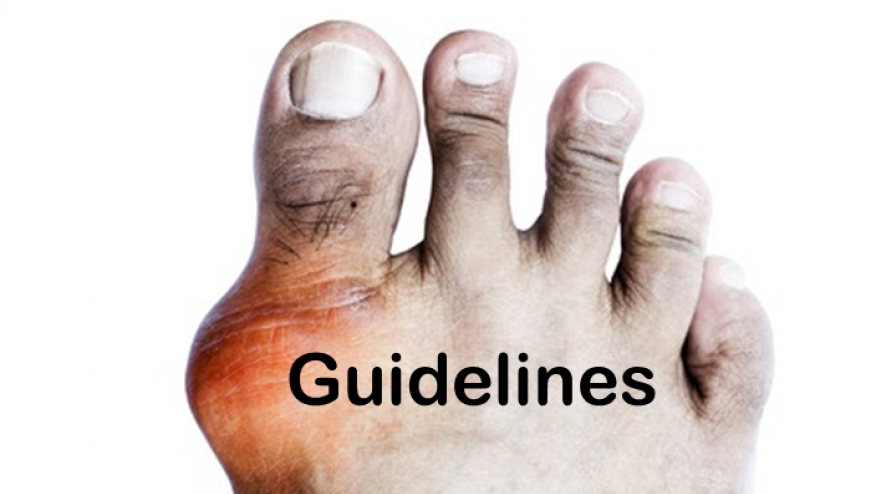ACP Gout Guidelines Reviewed and Critiqued by Rheumatologists Save

The American College of Physicians (ACP) has issued a series of recommendations on the diagnosis and treatment of gout. For instance, they advocate for the use of corticosteroids, nonsteroidal anti-inflammatory drugs (NSAIDs), or colchicine in acute gout.
The ACP clinical practice guideline for the management of acute and recurrent gout puts forth four recommendations:
- Recommendation 1: ACP recommends that clinicians choose corticosteroids, nonsteroidal anti-inflammatory drugs (NSAIDs), or colchicine to treat patients with acute gout. (Grade: strong recommendation, high-quality evidence)
- Recommendation 2: ACP recommends that clinicians use low-dose colchicine when using colchicine to treat acute gout. (Grade: strong recommendation, moderate-quality evidence). ACP recommends that if colchicine is used, it should be at a low dose, as lower doses of colchicine are as effective as higher doses but have fewer gastrointestinal adverse effects.
- Recommendation 3: ACP recommends against initiating long-term urate–lowering therapy in most patients after a first gout attack or in patients with infrequent attacks. (Grade: strong recommendation, moderate-quality evidence)
- Recommendation 4: ACP recommends that clinicians discuss benefits, harms, costs, and individual preferences with patients before initiating urate–lowering therapy, including concomitant prophylaxis, in patients with recurrent gout attacks. (Grade: strong recommendation, moderate-quality evidence)
Also published in the Annals of Internal Medicine are ACP guidelines on the diagnosis of gout, wherein the ACP recommends that physicians use synovial fluid analysis when clinical judgment indicates that diagnostic testing is necessary in those with possible gout (Citation source: http://buff.ly/2fvULt7). The clinical practice guideline for the diagnosis of gout can be found here - http://buff.ly/2fvXRx3.
In the same issue, Drs.Tuhina Neogi (Boston) and Ted Mikuls (Omaha) wrote an accompanying editorial of the ACP guidelines. While they agreed with the high strength of evidence favoring the use of colchicine, nonsteroidal anti-inflammatory drugs, and corticosteroids for gout flare management, they disagreed on the ACP view of treat-to-target. (Citation source: http://buff.ly/2fihAvg.)
The ACP categorized the treat-to-target strategy evidence as being "low" and Drs. Neogi and Mikuls found their assertion to be puzzling and countered that there is at least a moderate strength of evidence supporting monitoring of serum urate levels and using this as a guide to urate lowering therapy (ULT). They respond by saying the treat-to-avoid-symptoms approach (suggested by the ACP) has not been tested either.
The current ACP gout guidelines are based on 2 systematic evidence reviews sponsored by AHRQ and conducted by the RAND Corporation's Southern California Evidence-based Practice Center. Problematic is their non-endorsement of the 2012 ACR gout guidelines.
Drs. Mikuls and Neogi write, "The ACP CGC finds it difficult when it cannot endorse a widely disseminated recommendation from a fellow professional society because of a lack of adequate supporting evidence. Yet, it believes that evidence must direct guideline recommendations. Specifying clinical options when evidence is lacking is the role of expert consensus panels or best-practice statements, but these documents must not masquerade as the type of evidence-based guidelines defined by the IOM. As we try to provide our patients with the best possible care, we must be clear about when the best clinical decision is defined by high-quality evidence and when it is suggested by consensus."
The ACP guidelines have drawn criticism from numerous rheumatologists (see citations below):
- Medscape: http://buff.ly/2eoiZTn
- Medical Xpress: http://buff.ly/2feR0ot
- Commentation by Drs. Neogi and Mikuls: http://buff.ly/2fihAvg.










If you are a health practitioner, you may Login/Register to comment.
Due to the nature of these comment forums, only health practitioners are allowed to comment at this time.